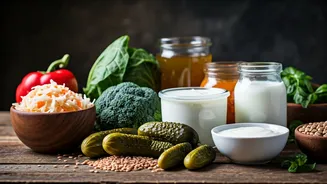Probiotics: Nature's Boost
Probiotics are live microorganisms that offer various health benefits, particularly for your digestive system. They are essentially beneficial bacteria
that reside in your gut, aiding in digestion, nutrient absorption, and immune function. The gut microbiome plays a vital role in overall health, influencing everything from mood to immunity. A balanced gut microbiome is essential for optimal health, and probiotics contribute to this balance by introducing or replenishing these beneficial bacteria. Probiotic-rich foods introduce these helpful microorganisms naturally, supporting a diverse and thriving gut environment. Maintaining a healthy gut microbiome with probiotics may help alleviate digestive issues, strengthen immunity, and promote overall wellness.
Yogurt: A Classic Choice
Yogurt is arguably the most well-known source of probiotics. Traditional yogurt, especially varieties containing live and active cultures, is packed with beneficial bacteria like Lactobacillus and Bifidobacterium. These bacteria help in maintaining a healthy balance of gut flora, enhancing digestion, and bolstering immunity. When choosing yogurt, opt for plain, unsweetened options to avoid added sugars, which can hinder the benefits. You can then customize the flavor by adding your own fruits or a touch of honey. Regular consumption of yogurt can significantly improve gut health, potentially alleviating symptoms of irritable bowel syndrome (IBS) and enhancing nutrient absorption. Yogurt's versatility makes it an easy addition to breakfasts, snacks, or even desserts, making it a convenient way to boost your probiotic intake.
Kefir: The Cultured Drink
Kefir, a fermented milk drink, has a tangier taste than yogurt and is richer in probiotics. It's made by fermenting milk with kefir grains, which are a complex mix of bacteria and yeast. Kefir is considered a powerhouse of probiotics, with a wider variety of strains than yogurt. The diverse range of microorganisms in kefir provides extensive benefits, contributing to digestive health, immune function, and bone health. Kefir can be enjoyed on its own as a refreshing drink or used in smoothies and other recipes. The probiotics in kefir can help reduce digestive issues such as bloating and constipation and contribute to a healthier gut microbiome. Its nutrient density, combined with its probiotic content, makes kefir a valuable addition to any diet.
Sauerkraut: Fermented Cabbage
Sauerkraut, or fermented cabbage, is a traditional food that offers significant probiotic benefits. Made by fermenting shredded cabbage in a salt solution, it produces lactic acid bacteria, which act as natural probiotics. This process not only preserves the cabbage but also infuses it with beneficial bacteria. Sauerkraut supports healthy digestion, enhances nutrient absorption, and boosts the immune system. When buying sauerkraut, ensure it's unpasteurized, as pasteurization kills the live and active cultures. Consuming a small portion of sauerkraut with meals can aid digestion and contribute to gut health. Its tangy flavor and crunchy texture make it an interesting addition to salads, sandwiches, or as a side dish, providing a delicious way to enjoy its probiotic benefits.
Kimchi: Korean Delight
Kimchi, a staple in Korean cuisine, is a fermented dish primarily made from napa cabbage and various seasonings. It's a powerhouse of probiotics, thanks to the fermentation process. Kimchi’s probiotic content supports digestion, boosts immunity, and offers anti-inflammatory properties. The variety of ingredients used in kimchi, including garlic and ginger, adds to its health benefits. These ingredients have antioxidant and antimicrobial properties that contribute to overall health. Incorporating kimchi into your diet can introduce beneficial bacteria, promoting a healthy gut microbiome and improving digestive health. Kimchi can be eaten as a side dish, added to soups, or incorporated into various recipes, making it an exciting and flavorful way to enhance your probiotic intake.
Kombucha: Fermented Tea
Kombucha is a fermented tea beverage that is growing in popularity. It is produced by fermenting sweetened tea with a symbiotic culture of bacteria and yeast (SCOBY). This fermentation process creates a fizzy, slightly sour drink rich in probiotics and beneficial acids. Kombucha can aid digestion, boost energy levels, and support immune function. The probiotics in kombucha contribute to a healthy gut microbiome, while the acids produced during fermentation may help with detoxification. When selecting kombucha, choose brands with lower sugar content. It is a refreshing beverage on its own and can be enjoyed as a healthier alternative to sugary drinks. Drinking kombucha can contribute to digestive health and overall well-being.
Pickles: Preserved Probiotics
While not all pickles contain probiotics, those that are traditionally fermented in a saltwater brine do. Fermented pickles, like sauerkraut, develop probiotics through lactic acid fermentation. These pickles are made without vinegar, which can kill off beneficial bacteria. These pickles can contribute to a healthy gut microbiome. They can aid digestion, support immune function, and offer antioxidant properties. Ensure that the pickles you choose are fermented, not pickled with vinegar. Fermented pickles add a tangy crunch to meals and can contribute to gut health. Consuming fermented pickles, in moderation, can be a delicious way to boost probiotic intake and support overall well-being.





















